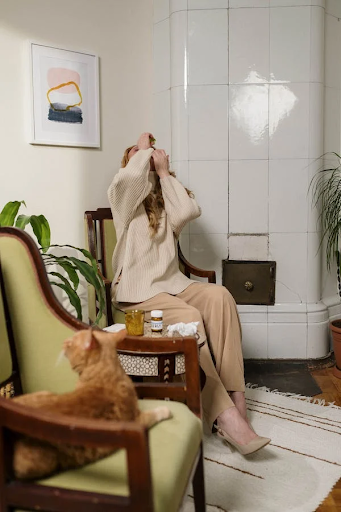 If you are one of the many millions of people that sneeze and sniffle as the cool breeze starts to set in for the year, you may have wondered what, exactly, triggers your seasonal allergies. According to Marla Ahlgrimm, there are many potential culprits. Fortunately, there are also a few ways that you can mitigate the effects of pollen throughout the late summer and into the fall.
If you are one of the many millions of people that sneeze and sniffle as the cool breeze starts to set in for the year, you may have wondered what, exactly, triggers your seasonal allergies. According to Marla Ahlgrimm, there are many potential culprits. Fortunately, there are also a few ways that you can mitigate the effects of pollen throughout the late summer and into the fall.
What Causes Seasonal Allergies?
Seasonal allergies are usually caused by pollen released from maturing plants from August through November. Ragweed is one of the most predominant culprits throughout the United States. Marla Ahlgrimm says that burning bush, tumbleweed, mugwort, and sagebrush are also common seasonal allergy triggers. In addition to these, Marla Ahlgrimm says some people are allergic to grass and mold, each of which gets kicked around its time to mow.
Factors That Affect The Severity Of Allergies
For most of us, our allergies are little more than red, watery eyes, a stuffy nose, and sneezing. Some people, however, may have a stronger immune reaction to some irritants. Marla Ahlgrimm says that those in areas of high heat and humidity or that have periods of drought followed by high winds may experience stronger allergies than others.
Allergy Management
Although many of us think that we just have to stay inside throughout the season, this isn’t true. Marla Ahlgrimm says there are a few ways that we can lessen the negative effects of allergies, especially in our homes. These include:
- Listen to the radio or watch the news each morning so that you know your local pollen and mold counts along with what’s blooming.
- Drive with the windows shut. It’s very tempting to roll the windows down, open the sunroof, or take the top off of your Jeep or convertible, that now is not the time unless you’d like to drive down the road sneezing and wiping the tears off your cheeks.
- Avoid the outdoors when pollen is high. During the spring and summer, pollen is highest in the evening. During the fall, especially during ragweed season, mornings are the hardest on those with allergies.
- Wear a mask when mowing the lawn. Marla Ahlgrimm says that an N-95 mask works wonders at keeping tiny pollen particles from entering your respiratory system when mowing the lawn or doing other outdoor chores.
- Shower often. A quick shower can help take pollen off of you so that it’s no longer an irritant indoors. This is especially important for women with long hair, as dust, pollen, and other debris can get caught only to be shaken out later.
- Look for unusual allergens. Some people are allergic to certain insect bites, chlorine, pine trees, and even smoke from campfires and bonfires. If you notice your allergies are worse around these, avoid them.
- Take over-the-counter antihistamines. One of the most important things you can do to lower the effects of allergies is talk to your pharmacist about antihistamines. Marla Ahlgrimm explains that these affect people differently, and what works for one person may not work for the other. You also want to ask your pharmacist about which ones cause drowsiness and which are less likely to affect you during your work day.

Marla Ahlgrimm says that there’s no way to completely prevent seasonal allergies. However, by knowing what you’re allergic to and taking steps to reduce the severity, you can get through the fall to enjoy your pumpkin spice without sneezing until the first snowfall.













 Marla Ahlgrimm has co-authored two ground-breaking books,
Marla Ahlgrimm has co-authored two ground-breaking books,